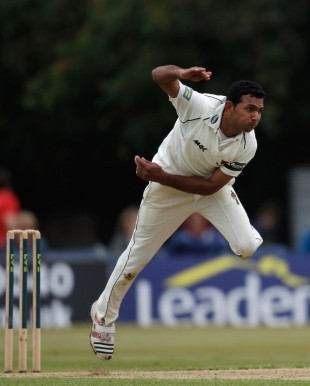- Corruption in cricket
ECB ban former Sussex player Arif for life

Naved Arif, the former Sussex player who was charged by the ECB with match-fixing, has been banned for life after he admitted breaching the board's Anti-Corruption Code.
The ECB's decision breaks new ground in the fight against cricket corruption in England. It is the first time that the governing body has concluded that the outcome of a county match in England was fixed.
"Mr Arif pleaded guilty to six breaches of the Code, all of which related to corrupt activity in connection with the CB40 fixture between Sussex and Kent at Hove in August 2011," the ECB said.
"His admissions were made in tape-recorded interviews with the ECB's anti-corruption unit and via signed statements. In accordance with the provisions of the ECB Anti-Corruption Code, Mr Arif has accepted an agreed sanction of a life ban from all forms of cricket."
Arif will now not be able to play, coach or participate in any form of cricket recognised by the ECB, the ICC or any other national board. He was playing for Little Stoke in the North Staffordshire and South Cheshire League at the start of the English club season before a temporary suspension was imposed in April 2014.
The ECB persisted with the investigation after two other lines of enquiry failed to bring results. The Sussex v Kent match in question was investigated and cleared by the ICC's anti-corruption unit (ACSU), which found insufficient evidence, before the ECB reopened the case in 2012.
Sussex also found no evidence during its own internal investigation. The county indicated that it would be making no comment on the outcome.
David Collier, the ECB's chief executive, said: "Today's announcement sends out a very clear message that ECB has a zero-tolerance approach to corruption in cricket and that it will root out and punish those who pose a threat to the game's integrity.
We thank the anti-corruption team for their work in bringing this case and trust that it will serve as a stark reminder to all players of the dangers that corrupt activities pose to their careers and livelihoods."
Naved Arif, 32, represented Pakistan A in 2009 on a tour of Australia. He played for Sussex as an English-qualified player by virtue of a Danish wife.
There is rich irony in the fact that he joined Sussex in 2011 on the same day as they signed the New Zealand Test batsman, Lou Vincent. Vincent and Arif were charged simultaneously with match-fixing by the ECB. Vincent was charged with 14 offences in relation to two matches in 2011, while Arif was charged with six offences.
Vincent's charges relate not just to the Kent match, but a Sussex T20 contest against Lancashire in the same season. Arif's charges only concerned the Kent fixture.
Arif played four Championship matches in 2011, but was more of a regular in the 40-over team and faced Kent on August 23 that year in a televised match that has been long under suspicion, despite being cleared by ICC. Arif made 11 off 29 balls as, from a position of considerable strength, Sussex failed to achieve their target of 217. He had earlier conceded 41 runs in six overs without taking a wicket.
In 2012 he made seven Championship appearances, his last game for the county coming against Warwickshire at Edgbaston. He was released at the end of the season.
The ECB charges were made after details of a separate ICC investigation into fixing involving Vincent were leaked to the media last week. Vincent is said to have provided evidence to the ICC of fixing involving 12 matches around the world between 2008 and 2012.
The ECB has successfully pursued one other case of corruption in county cricket, although this involved spot fixing - rigging an episode in a match - rather than fixing the result of the match itself.
The former Essex seam bowler, Mervyn Westfield served eight weeks of a four-month prison sentence for accepting £6,000 to deliberately bowl badly in a one-day game for Essex against Durham in 2009.
His evidence that he was introduced to cricket corruption by the former Pakistan leg spinner Danish Kaneria led Kaneria to be banned for life.

